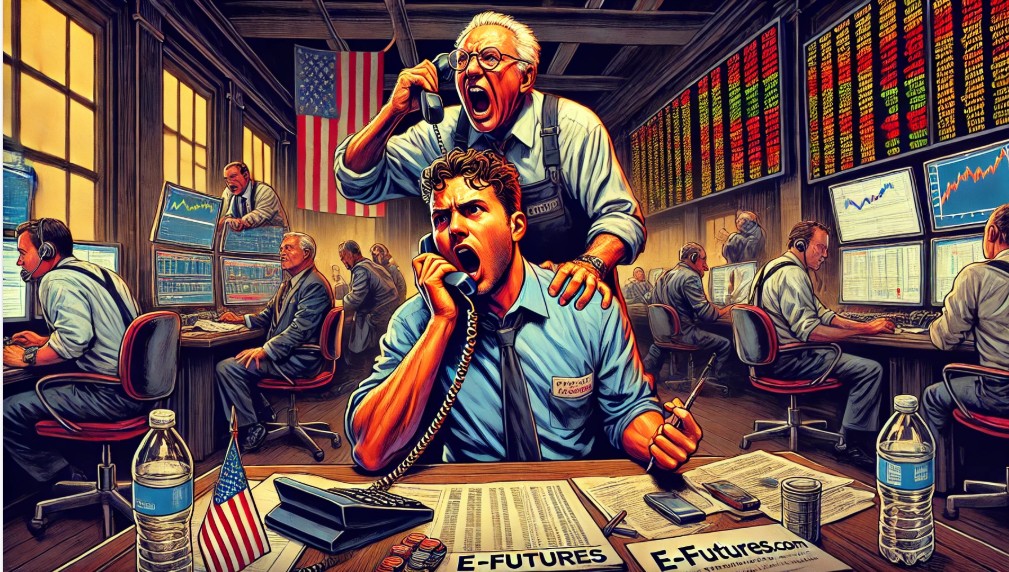When it comes to the best trading platform futures traders rely on, one name consistently stands out: E-Futures.com. With its stellar reputation, extensive regulatory compliance, and a track record of excellence in commodity brokerage, this platform provides futures traders with an exceptional experience in futures contract trading. At the heart of E-Futures.com’s success is its cutting-edge trading platform, CannonX. This article provides a detailed critique of CannonX, the key figures behind its launch, and a comparison to competing platforms. It also explores real-world case studies, the risk potential, and why E-Futures.com remains the best futures trading platform for both seasoned traders and beginners.
CannonX: A Top Futures Trading E-Mini Futures Platform
CannonX is a high-powered, professional-grade futures trading platform developed to serve both retail and institutional futures traders. Launched by E-Futures.com’s parent company, Cannon Trading, this platform was designed to offer unparalleled execution speed, deep market insights, and sophisticated trading tools.
Key Figures Behind CannonX
CannonX owes its development and market introduction to a team of experienced traders and technologists with decades of expertise in trading futures. Key figures include:
- Patrick Zielbauer – A seasoned professional in futures contract trading, Zielbauer played a crucial role in CannonX’s strategy and rollout.
- Ilan Levy-Mayer – The Vice President of Cannon Trading, Mayer has been instrumental in the development of high-frequency trading strategies for futures broker solutions.
- Michael K. Burke – A former CME pit trader and algorithmic trading specialist who contributed to CannonX’s advanced market analytics features.
- Ed Modla – A respected voice in futures trading e mini futures, Modla helped refine the options analytics tools within CannonX.
These individuals collectively ensured that CannonX could compete with, and often outperform, competitors like NinjaTrader, TradeStation, and CQG.
Advantages of CannonX Over Other Futures Trading Platforms
- Unrivaled Execution Speed
One of CannonX’s greatest strengths is its execution speed. Unlike other platforms that rely on third-party data feeds, CannonX integrates directly with exchange servers, reducing latency and ensuring trades are filled at optimal prices. This is especially crucial for trading futures e mini futures, where milliseconds can make or break a trade. - Superior Market Depth Visualization
CannonX provides DOM (Depth of Market) displays that rival even institutional trading platforms like TT (Trading Technologies). Traders can see the full order book with Level II data, a feature lacking in many competing platforms. - Advanced Order Types
- Iceberg Orders – Ideal for institutional traders looking to execute large trades without revealing full order size.
- OCO (One Cancels Other) Orders – A risk-management staple not as customizable on competitors like NinjaTrader.
- Bracket Orders – Ensures automated profit-taking and stop-loss levels, a key feature for high-frequency trading futures strategies.
- Algorithmic Trading Support
Unlike ThinkOrSwim and TradeStation, which require extensive scripting knowledge, CannonX supports plug-and-play automated trading systems (ATS). This gives traders an edge, particularly those focused on micro futures and scalping strategies. - Integrated Market Analytics & Proprietary IndicatorsCannonX includes proprietary indicators developed by veteran futures trader Michael K. Burke, such as:
- Momentum Swing Predictor – Ideal for micro futures traders looking to time reversals.
- Volume Footprint Analysis – Used by professional commodity brokerage firms to assess institutional order flow.
Disadvantages of CannonX
- Limited Mobile Functionality
Unlike platforms like MetaTrader 5 (MT5) or Interactive Brokers’ TWS, CannonX’s mobile version lacks full feature parity. This can be a drawback for traders who need real-time access from their smartphones.
- Learning Curve for New Traders
Despite its robustness, CannonX is not as beginner-friendly as simpler platforms like TD Ameritrade’s ThinkOrSwim. However, for those serious about trading futures, the platform’s advanced features more than make up for the initial learning curve.
- Higher System Requirements
Due to its real-time processing capabilities, CannonX demands a powerful computer. Traders using older hardware may experience lag, particularly during high-volatility sessions in futures contract trading.
Hypothetical Case Studies in Futures Trading Using CannonX
Case Study 1: E-mini S&P 500 Breakout Strategy
In October 2023, a professional trader utilized CannonX to execute a breakout strategy on the E-mini S&P 500 contract. By leveraging the platform’s Volume Footprint Analysis, they identified a high-probability liquidity zone and placed an Iceberg Order. The result? A 37% ROI within three trading sessions.
Case Study 2: Micro Futures Hedging Strategy
A Chicago-based commodity brokerage firm used CannonX to hedge soybean futures against expected market fluctuations. By integrating the platform’s spread-trading tools, they successfully mitigated risk and improved their hedge efficiency by 22% compared to previous strategies executed on CQG.
Risk Potential in Trading Futures
While CannonX provides world-class trading tools, futures trading e mini futures and micro contracts come with inherent risks:
- Leverage Risks – Futures contracts require margin, meaning small price movements can lead to significant losses.
- Liquidity Risks – Low-volume contracts (e.g., certain micros futures) can experience slippage.
- Overnight Gaps – Unexpected price movements between sessions can trigger margin calls.
- Emotional Trading – Without strict risk management, traders can fall into revenge trading cycles.
Why E-Futures.com is a Great Futures Trading Platform for All Experience Levels
- TrustPilot Rating & Reputation
E-Futures.com boasts a 5 out of 5-star rating on TrustPilot, a rarity among futures brokers. This speaks to their exceptional customer service, trade execution, and platform reliability.
- Compliance with NFA & CFTC Regulations
E-Futures.com adheres strictly to National Futures Association (NFA) and Commodity Futures Trading Commission (CFTC) guidelines, ensuring traders operate in a secure, transparent environment.
- Access to Micro Futures & E-mini Contracts
Unlike some brokerage firms that focus only on high-volume traders, E-Futures.com supports micros futures, making it accessible to retail traders with smaller capital.
- Educational Resources & Mentorship
For traders new to futures contract trading, E-Futures.com provides:
- Live webinars with industry experts
- Simulated trading accounts for practice
- One-on-one coaching for developing trading strategies
CannonX on E-Futures.com stands as the best trading platform futures traders can access today. With its lightning-fast execution, advanced market visualization, and algorithmic trading capabilities, it surpasses competitors like NinjaTrader, TradeStation, and CQG. While it does have a learning curve and higher system requirements, its institutional-grade features make it the ultimate choice for serious futures traders.
For traders seeking an NFA-compliant, top-rated, and feature-rich platform, E-Futures.com remains the clear leader in the futures trading e mini futures space. Whether you are a beginner exploring what is futures trading or a seasoned commodity brokerage professional, CannonX offers the tools needed for success in trading futures.
To open an account with E-Futures.com, please click here.
Ready to start trading futures? Call US 1(800)454-9572 – Int’l (310)859-9572 email info@cannontrading.com and speak to one of our experienced, Series-3 licensed futures brokers and start your futures trading journey with E-Futures.com today.
Disclaimer – Trading Futures, Options on Futures, and retail off-exchange foreign currency transactions involves substantial risk of loss and is not suitable for all investors. Past performance is not indicative of future results. You should carefully consider whether trading is suitable for you in light of your circumstances, knowledge, and financial resources. You may lose all or more of your initial investment. Opinions, market data, and recommendations are subject to change at any time.
Important: Trading commodity futures and options involves a substantial risk of loss. The recommendations contained in this writing are of opinion only and do not guarantee any profits. This writing is for educational purposes. Past performances are not necessarily indicative of future results.
**This article has been generated with the help of AI Technology. It has been modified from the original draft for accuracy and compliance.
***@cannontrading on all socials








